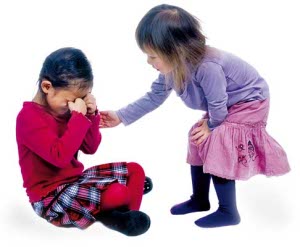What does it mean to forgive and does it help us or hurt us?

Gint Aras wrote an interesting essay for The Good Men Project about whether or not we should forgive apologetic bullies. (see: http://goodmenproject.com/featured-content/should-we-forgive-apologetic-bullies/) The essay is a philosophic consideration of what to do if the person who bullied you as a child realizes the harm they caused and seeks your forgiveness as an adult.
He makes the point that you can’t forgive a bully who is still bullying. They don’t seek forgiveness anyway. Forgiveness is only really possible if the bullying has stopped and is no longer a problem.
Aras makes some good points. The idea of forgiving someone who caused us so much emotional damage during our formative years is a terrifying thought to many people. But does it have to be that way?
Whenever I speak to people about this concept of forgiveness or compassion for a bully, I meet resistance. A lot of it is fear based resistance. Bullying is about power. When you are bullied, the bully takes control away from you. It is a horrifying experience and for good reason.
When we are asked to consider forgiveness for someone who has had control over us, many of us relive that lack of control and don’t want to experience it again. However, forgiving someone doesn’t mean giving that person access to you or relinquishing your power to them. It simply means that you aren’t going to give them any more thought or allow them to continue to control you through latent fear.
When you agree to forgive, you are basically saying, I am not afraid of you anymore and you can’t hurt me anymore. And I am so at ease in the person I have become that I can bestow upon you forgiveness.
Now, obviously, if you are not there emotionally, you can’t forgive the other person and you shouldn’t pretend you can. But wouldn’t it be great if you could? And isn’t that what you should be moving towards for yourself. This question of whether or not to forgive is a great time to revisit past hurts and to decide, I’m not going to live in fear of this hurt anymore. That way, if you are ever asked for forgiveness, you can give it without hesitation because the person who is requesting it elicits an emotionally neutral response in you. True forgiveness is something you do for you.
